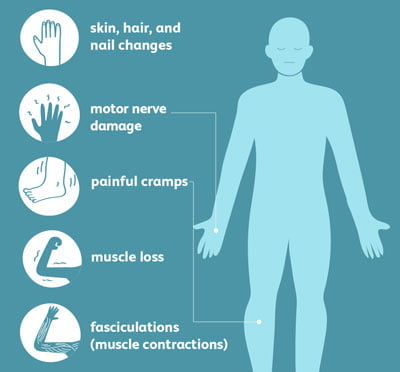Because peripheral neuralgia can lead to disabling consequences if not treated properly, it’s essential that you don’t ignore the signs that you may have the condition. In New York, call the experts in peripheral neuralgia treatment at Pain Management NYC for a thorough evaluation and interventional treatment that ensures you can go on pain-free without serious side effects. The nationally recognized doctors at this pain clinic rely on the most advanced diagnostic equipment and the latest pain treatment options to treat your individual symptoms and underlying conditions.
Neuralgia describes the experience of feeling recurring pain that comes in short bursts along a small part of your body or along the pathway of a nerve. Because it involves the nervous system outside the brain and spine, it’s called peripheral neuralgia. It’s also referred to as peripheral neuropathy.
The pain of peripheral neuralgia doesn’t come from stimulation of pain-receptor cells, so most normal pain-relieving medications are ineffective. To combat this type of pain, you need experienced pain doctors in New York who can properly diagnose your condition and provide the best peripheral neuralgia treatment. You’ll find these nationally recognized physicians at Pain Management near me in Midtown Manhattan.
Causes of Peripheral Neuralgia
Peripheral neuralgia is a secondary condition. This means that it results from another disease or injury. Damage to the nerve from an injury, compression or disease that affects the structure and function of a nerve causes the burning, shock-like sensations associated with peripheral neuralgia. Some of the more common conditions that lead to neuropathy include:
- Diabetes is the most common disease that leads to peripheral neuralgia.
- Bone marrow disorders, such as cancer, too much protein in your bones or other malfunctions of the marrow cause neuropathy conditions.
- Autoimmune disorders, including rheumatoid arthritis, lupus, Guillain-Barre syndrome and chronic inflammatory disorders cause damage.
- Infections such as shingles, Epstein-Barr virus, HIV, hepatitis B and C, diphtheria and leprosy result in noticeable nerve damage.
- Some hereditary disorders affect the growth and functioning of nerves.
- Tumors, thyroid disorder, liver disease and kidney malfunctions damage the firing and function of nerves, leading to pain and discomfort.
- Some medications, exposure to environmental poisons and vitamin deficiencies impair the proper functioning of your nerves.

Symptoms of Peripheral Neuralgia
Your symptoms depend on which nerves have been affected by the neuralgia. Because each nerve has its own function, symptoms may be widely varied, which is why you need to rely on experts in diagnosing and treating your specific pain and its source. Your symptoms may include:
- Burning, shock-like pain
- Lack of coordination
- Weakness in the affected muscles
- Frustrating sensitivity to touch
- Paralysis
- The sensation of wearing gloves or socks, although your skin is bare
- Slow but increasing tingling, numbness or prickling, especially in your arms and hands or legs and feet
- An intolerance to heat, with possible excessive sweating or not being able to sweat at all
- Dizziness that may be due to changes in your blood pressure
- Digestive, bladder or bowel problems
Some of the major concerns regarding peripheral neuralgia are that with the numbness or lessened sensation, you may not be able to detect infections, burns and other skin traumas. And with weakness occurring in some muscles, balance and falling become issues as well. Don’t wait to visit your top doctors at pain management clinic in New York to avoid serious consequences.
Diagnosing and Treating your Peripheral Neuralgia
Diagnosis usually involves a neurological examination, along with a complete medical history. Your doctor may order additional tests such as imaging tests, blood work, nerve function tests and biopsies of your nerves and skin. Your pain doctor applies a multidisciplinary approach to treatment — and that calls for him to treat the primary condition, as well as the secondary neuropathy.
Treatment goals not only work to manage or resolve your underlying condition, but also to treat and reduce your symptoms. If your tests don’t initially detect the primary condition, your doctor may adopt a wait-and-see approach, carefully observing any changes. Treatment options include:
- Topical treatment with capsaicin cream or lidocaine patches
- Prescription and over-the-counter pain relievers
- Anti-depressants that target the pain system
- Anti-seizure medications, which often help reduce nerve pain
- Transcutaneous electrical nerve stimulation (TENS), to help nerves regenerate some function
- Physical therapy to strengthen weakened muscles and increase flexibility
- Nerve block injections to reduce your suffering so you can participate in your physical therapy
Those with inflammatory conditions may benefit from plasma exchange and intravenous immune globulin. This involves removing your blood and removing proteins and antibodies to help suppress your immune system. If the nerve damage involves compression or tumors, surgery to remove the pressure or growth may help relieve your pain.
Prevent Further Painful Days
If you’ve been diagnosed with peripheral neuralgia, practice good at-home treatment as well. Quit smoking, get regular but gentle exercise, reduce your alcohol consumption, eat healthy meals, take care of your feet and monitor your blood glucose levels. These steps help reduce the severity of your peripheral neuralgia symptoms.
Because nerve damage can cause continuous and ongoing issues, talk to your doctor regarding the best possible peripheral neuralgia treatment available. If left untreated, your neuropathy symptoms could escalate to a disabling degree. Contact the best pain management specialists today for an appointment.

Leon Reyfman, MD, is a top-rated, best-in-class interventional pain management doctor. He is a nationally recognized pain relief specialist and is among the top pain care doctors in New York City and the country. He is an award-winning expert and contributor to prominent media outlets.
Dr. Leon Reyfman has been recognized for his thoughtful, thorough, modern approach to treating chronic pain. He has been named a “top pain management doctor in New York” and one of “America’s Top Doctors™” for advanced sports injury treatments. Among other accolades, he was voted by peers as a “Castle Connolly Top Doctors™” and “New York Super Doctors™”. Dr. Leon Reyfman was a part of the medical team at the 2016 Summer Olympic Games in Rio de Janeiro, Brazil.
